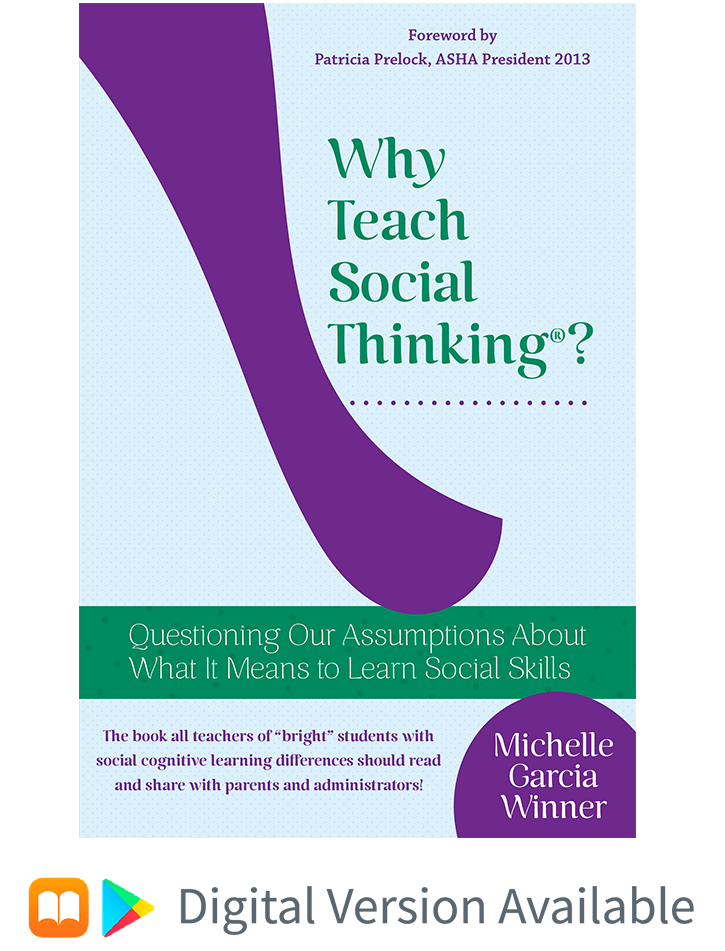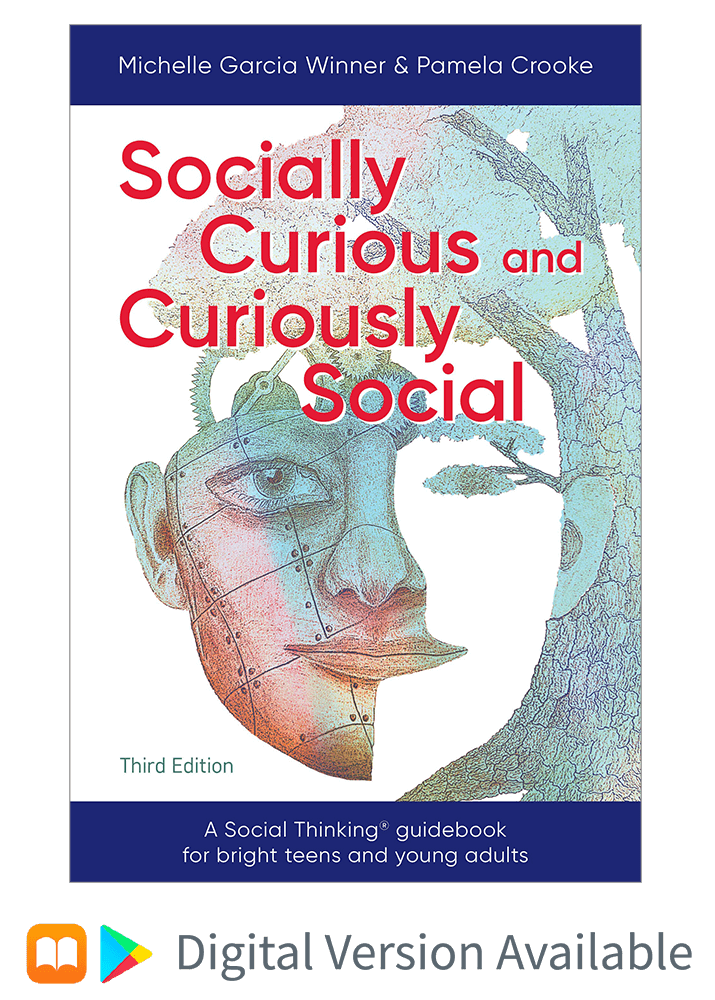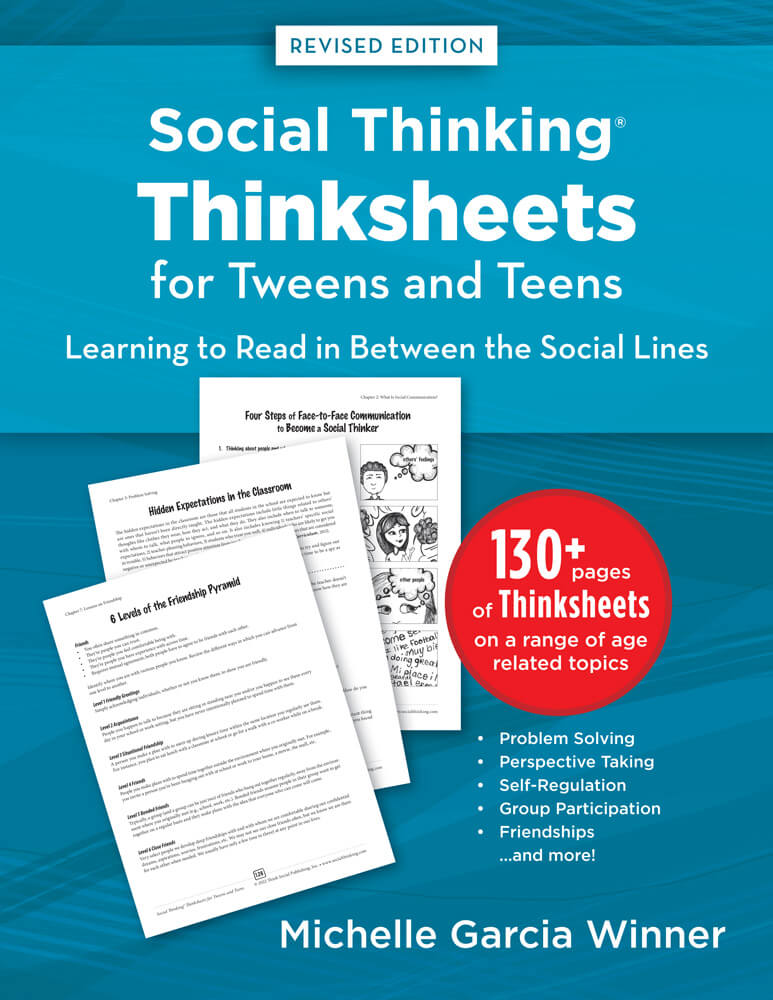Updated: May, 2015
© 2021 Think Social Publishing, Inc.
I didn't know what to do with Jake.
A friendly but lonely high school freshman, Jake desperately needed a social group— an opportunity to develop cognitive flexibility and learn strategies to manage the anger that was blocking him out of friendships.
My challenge was not so much with Jake, but with the available peer group I could place him in. The only kids I had around at the time were a bunch of middle school boys. They needed similar Social Thinking® strategies, but being grouped with squeaky-voiced twelve-year-olds would destroy Jake's already struggling ego. I couldn't just turn Jake away, though, so I made him a mentor.
Jake was the very first student involved in the Skills for Living Student Mentoring Program—a vibrant program that is in constant evolution, growing with the needs of our students and the creativity of our staff. The program started in 2010 and now includes 20 teens, ages 13-18, mentoring 100 students, guided by three professional staff.
These days at Skills for Living, it's common for a few mentors to gather in the lounge to discuss social group plans for the week. It's typical for an eighth-grade mentor to grab a dry erase marker and diagram how to "deal with a boring moment" for a small group of third graders. Middle school boys regularly burst through the front door seeking a high school mentor to help solve a major problem (like how to talk to a girl).
Powerfully Based in Social Thinking
Like all of the programs at Skills for Living, the mentoring program is available to a diverse range of social learners. About half of our student mentors have been identified with a social learning disability, while the others are considered neurotypical, but have had social challenges that are either developmental or environmental in nature.
The Skills for Living Student Mentor Program is anchored in Social Thinking, a concept developed by Michelle Garcia Winner. Social Thinking helps students recognize, reflect on, and respond to other people's thoughts and actions. It is a particularly effective approach with students who have been identified with a social learning challenge such as an autism spectrum disorder, Asperger's Syndrome, or a nonverbal learning disability. But at Skills for Living, we find Social Thinking to be useful with all our students and mentors, regardless of an identified disability.
Learn to Teach, Teach to Learn
Students participate in a Social Thinking group with their peers before becoming a mentor. As a group, they learn Social Thinking vocabulary and concepts through a variety of curricula including Social Fate or Social Fortune, Superflex®, The Incredible 5 Point Scale, and Zones of Regulation.
The vast majority of students involved in the Student Mentoring Program are higher functioning (they have good verbal abilities and are reasonably to very successful in their academics), so they respond well to Social Thinking, and are eager to share their knowledge. In their group, student mentors are taught how to apply the Social Thinking concepts in their own lives, and are then, through discussion and role playing, shown how to effectively share them with younger students as a mentor.
After six weeks participating in their own Social Thinking group, student mentors are paired with a group of younger, like-minded learners.
The mentor's role is to assist the group leader by demonstrating Social Thinking concepts, share relevant stories from his or her own life, and teach simple Social Thinking lessons.
Great care is taken to match mentors with their younger social counterparts:
- Dave, a high school sophomore with a passion for The Three Stooges and an ongoing struggle with the Unthinkable Rock Brain (Madrigal and Winner, 2008), was pleasantly surprised to be paired with a group who he described to be the "younger version of him."
- Brian, a high school basketball player, was thrilled to find a group of fourth graders who had a passion for sports, but shared his lifelong struggle with impulsivity and emotional management. "I want to help these guys," he told me. "I want it to be easier for them than it was for me."
- Emma, a quiet junior who has long struggled with social anxiety, seemed to find her voice as the mentor of "The Art of Social Thinking," a group that fuses art therapy with Social Thinking concepts for middle school girls.
While in the group, mentors are instructed to "actively participate as a role model," interacting with the leader, lesson, and students in a way that is age-expected for the group. For example, mentors in our "Social Seedlings" groups are expected to play on the rug with preschoolers, share and take turns, combine imagination, and take direction from their teacher. Mentors assigned to elementary age groups sit at the table, listen with their eyes, and model whole body participation.
Mentoring Expands Modeling
Comprehensive mentoring offers a more powerful approach than traditional peer modeling. In general, modeling places a similarly aged neurotypical child with a group of students who have social learning challenges.
Mentoring has a broader benefit. Younger students in the group grow from having an older role model who looks and thinks like they do. They have a chance to know someone who, despite sharing in their challenges, has achieved some level of success.
In turn, the process benefits the student mentor immeasurably. Being present in a younger group allows the mentor to access Social Thinking at a concrete level, and by teaching, the concepts become practical and meaningful. Even more significant are the relationships that develop. Younger students quickly come to admire and respect their mentor. For many mentors, being truly important to a group of people outside their family is a novel experience.
Measuring Success
Mentors take a basic pre and post-test of Social Thinking concepts, but meaningful growth is harder to prove numerically. Rather, we observe success in our students:
- Rodney, a neurotypical eighth-grader, could make but never keep a friend. He struggled with perspective taking and accidental bragging. Last summer, Rodney had to drop out of our mentoring program because his ever increasing social life had become a bit too much. It was hard for Rodney to leave a sleepover with his friends to make it to his Saturday morning preschool group on time.
- Sarah, a high school sophomore with weak social observation skills (and a very strong desire to be right—all of the time) walked away from a potential conflict with a peer over the definition of a word, saying "Eh, we talked about this with my mentoring kids. It's a small problem. Not worth a fight."
- At a community-wide holiday party, I raised my hand to get the attention of an increasingly excited group of twenty kids. When the room was quiet, Marvin, a seventh grader with low social radar (and a flair for silliness) said, "Sounds like we're getting a bit too goofy, guys. We need to take it down a notch."
Making Mentoring Work in a Number of Situations
Mentoring programs do not need to be comprehensive to be meaningful, and can work in a variety of settings.
Mentoring might look like an eighth-grader eating lunch with two sixth-graders in the middle school guidance office. It could be a fifth grade student participating with a group of second graders during speech-language pull out. Mentoring could be a third-grade student teaching a group of like-minded kindergarteners how to play chess during recess, or a senior joining a ninth-grade executive functioning group.
The key to a successful student mentoring experience lies in a few basic details:
- Match mentors to like-minded learners. Matching a mentor to a group with similar Social Thinking skills is essential to both the mentor's growth and the group viewing their mentor as a peer leader.
- Consistency. Mentoring is an ongoing commitment. Mentor students need to know and agree to the time involved.
- Mentor Coaching. Student mentors need guidance outside of their mentoring experience. This could be as little as a few minutes of coaching each week.
- Feedback. Communication about progress with the student mentor and his or her parents supports learning and carryover conversations at home.
Jake's Progress
Jake is now a high school senior. He continues to mentor. Jake is driving, has a job at a local restaurant, and is applying to college. His social life is not perfect. He continues to meet—and work through—his Social Thinking challenges as they arise. However he gets it... Jake knows his strengths and weaknesses, and is proud of his accomplishments.
Recently, after hearing about a group of sad third graders who were not socially included in recess football games, Jake showed up with a friend and two Nerf footballs. "I know how that feels—being left out at recess. It stinks. My buddy and I know how to throw a football. We want to help."
BIO
Katy Shamitz, M.S. is the founder and director of Skills for Living, a social learning community in Norwell, MA. A school counselor by training, Katy believes that for social learning to stick, it needs to be learned—and practiced—in a real, messy, people-centered environment. Most of the learning at Skills for Living happens away from the group table. Learn more about Skills for Living at http://www.skillsforliving.com.













